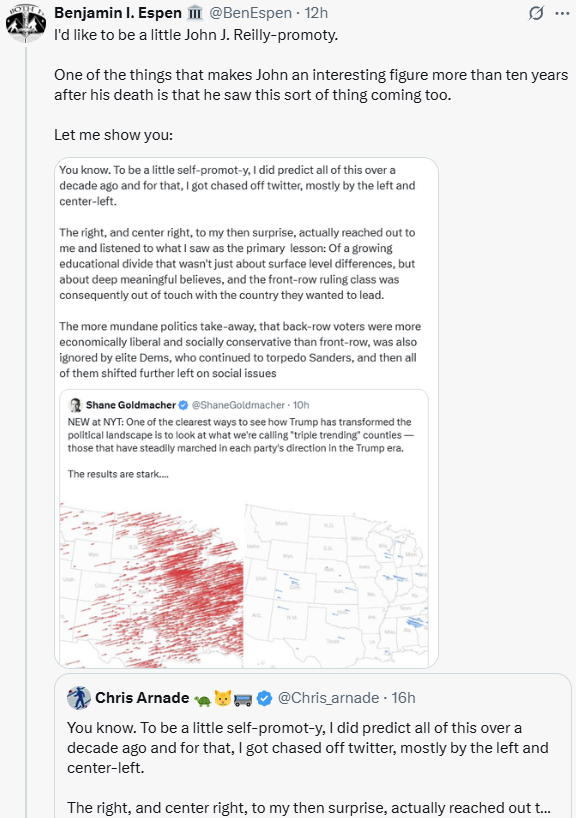The Long View 2004-07-16: I Read These Things So You Don't Have To
John is presumably past caring at this point. However:
His arguments carry less force now, however, because they included some falsifiable predictions:
"U.S. military forces may exhaust the remnants of the Ba'ath but that will not overcome Shi'a groups like Moqtada Sadr's militia."
That is pretty much the opposite of what has happened.
Well....
I Read These Things So You Don't Have To
If you are the sort of dutiful person who believes in high-fiber vacation reading, you can take along a copy of the Summer 2004 issue of The National Interest to the beach. Among other things, it contains a symposium, "Iraq at the Turn," with no fewer than 18 sober contributors. Yum. As is ever the peril with quarterlies, many of the contributions have been dated by events, especially since many of them seem to have been finalized during the nasty patch in the spring, when it seemed as if the wheels were falling off in Iraq.
This is most apparent in William E. Odom's contribution, "Retreating in Good Order." Using such terms as "strategic disaster" to describe the situation in Iraq, he argues that, since there was no benefit to be had from occupying Iraq to begin with, the best course would be to minimize losses by simply withdrawing as quickly as possible. Again, in April, that was a disturbingly plausible thing to say. His arguments carry less force now, however, because they included some falsifiable predictions:
"U.S. military forces may exhaust the remnants of the Ba'ath but that will not overcome Shi'a groups like Moqtada Sadr's militia."
That is pretty much the opposite of what has happened.
* * *
Francis Fukuyama's keynote article, "The Neoconservative Moment," is not technically part of the symposium, but it does address the issue of the consequences of withdrawal before the new government is secure:
"During the Cold War, when our power was more or less evenly matched against that of the Soviets, we cared a great deal about credibility and slippery slopes. We were afraid that withdrawal in the face of a challenge would be taken as a sign of weakness and exploited by the other side. Today, the United States is utterly dominant in the military sphere. Credibility in our willingness and ability to use force remains important, but we simply do not have to prove our toughness to the rest of the world at every turn."
This is so breathtakingly counterfactual that it takes a real effort of imagination to understand what he is trying to say. Obviously, in dealing with the Islamofascist threat, nothing counts more than the appearance of toughness. After some thought, I realized that Fukuyama meant that America's place in the formal international system is secure, almost no matter what happens. Even if a nuke goes off at the Washington Monument and a hijacked airliner flies into the Golden Gate Bridge, even if Osama bin Laden is acclaimed caliph in liberated Baghdad and immediately declares himself the Protector of the Two Holy Places, the United States would still have a veto on the UN Security Council, it would still have the only all-ocean navy, and it would still be the center of a planetary system of alliances.
That's perfectly true. However, what the foreign policy establishment has yet to grasp is that the international system in which they work is increasingly irrelevant to American security, or at any rate, to the current set of threats. There is a saying, "You can't rule the world from 30,000 feet," meaning that strategic bombing has limited uses. The problem is that NGO-land, and UN World, and Space Station WTO, all live in a world that is metaphorically at 30,000 feet. They just are not in the same frame of reference as the Islamofascists, or the would-be nuke entrepreneurs.
The institutional international system is not without importance. However, it should be thought of like a market that is no longer growing, and whose products have been commoditized. It can often be bracketed, while serious statecraft happens elsewhere.
* * *
Then there were some contributors to this issue whose reasoning defies even the most sympathetic analysis. Chief among them is Martin Sieff. In "Sand in Our Eyes: U.S.-Saudi Relations After Iraq," he advises us thusly:
"To restore the sundered trust between Washington and Riyadh, the Saudis need to be convinced by a serious commitment that the United States will not initiate any new ambitious operation or strategy for 'regime change' in neighboring countries such as Syria or Iran."
You do that, Martin.
* * *
The National Interest is not the only thing I read in the summer. Sometimes I read City Journal, where Theodore Dalrymple has an analysis of the growing criminal underclass in Britain of Pakistani origin, entitled When Islam Breaks Down. Among other things, he says:
... What I think these young Muslim prisoners demonstrate is that the rigidity of the traditional code by which their parents live, with its universalist pretensions and emphasis on outward conformity to them, is all or nothing; when it dissolves, it dissolves completely and leaves nothing in its place.
... Islam in the modern world is weak and brittle, not strong: that accounts for its so frequent shrillness. The Shah will, sooner or later, triumph over the Ayatollah in Iran...
Readers may recall that I have had some thoughts along these lines myself. About Dalrymple's remarks, I would add just two points:
(1) The underclass he is talking about in Britain seems to be an artifact of the welfare state. In Europe, too, an Islamofascist Fifth Column seems to have been nurtured on the dole. In the US, though the Immigration Service is clueless about who is in the country and why, it is much harder for young men to be idly homicidal. Even the 911 hijackers had jobs.
(2) Dalrymple is almost certainly wrong to suggest that Islam in the West will simply succumb to all-conquering secularization. That it will succumb is a good bet, but that will happen in part because it sparks a series of Christian revivals.
Copyright © 2004 by John J. Reilly



Comments ()